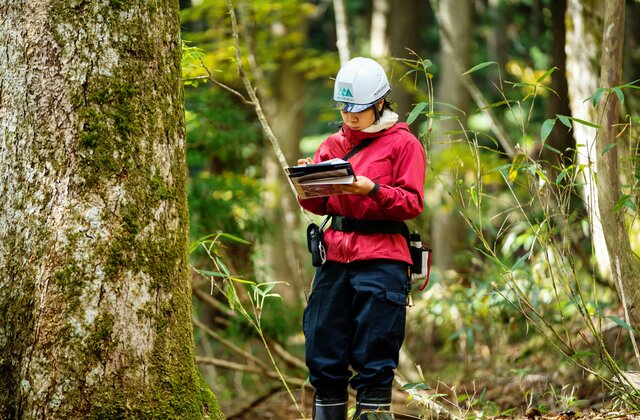Education & Career Trends: May 30, 2024
Curated by the Knowledge Team of ICS Career GPS

- Article by Ghosia Tabassum, published on scholarship-positions.com. Original article link.
Forestry as a profession encompasses the science and practice of establishing, managing, using, and conserving forests, trees and associated resources in a sustainable manner to meet desired goals, needs, and values. Forests and wildlife are always linked together, they serve as a home for animals and also are a rich resource of food, timber and medicinal plants. Therefore, the conservation and protection of forests is necessary.
Specially trained persons like forestry specialists, forestry management experts and forest officers are required for the development and management of forests and the wildlife. Forestry includes protecting, conserving and upgrading forest resources.
A range of forestry and wildlife degrees enable students to concentrate on animal welfare, soil science, environmentalism and many other specialised areas.
What courses can you pursue?
- Forest and Woodland Management
- Forest Ecosystem Management
- Forest Resources Management
- Wildlife Sciences
- Forest products
- Wood Science and Technology
- Conservation Biology and many more.
Some campuses that offer forestry and wildlife related programmes:
In India:
- Forestry Research Institute in Bhopal (India)
- Indian Institute of Forest Management in Dehra Dun (India)
- Orissa University of Agriculture and Technology (India)
Internationally:
- University of Georgia in Athens (Greece)
- University of Florida (USA)
- University of Washington-Seattle Campus (USA)
among many other places.
Where can you work?
There are various government and non-government departments of forestry and wildlife which provide job opportunities. There are opportunities in NGOs working for the conservation and upgradation of forests.
- There are also options available for research work in public sectors, research institutions like the Indian Council of Forestry Research and Education (ICFRE), Institute of Social Forestry and Eco-rehabilitation and Wildlife Research Institutes.
- Botanical and zoological parks, wildlife sanctuaries and national parks also have the requirements for forestry graduates.
- Still photography, filmmaking, wildlife journalism etc. are other career options available to forestry graduates.
- Television channels like Discovery and Natural Geographic provide full-time prospects.
- Organisations like the World Wildlife Fund (WWF), Centre for Environment Education, Tata Energy Research Institute (TERI) and consultancy firms like Ernst and Young and KPMG hire several Forest and Wildlife graduates annually.
- Other International agencies like, FAO, DANIDA, CIFOR, SIDA, USAID, DFID, etc. also hire forestry graduates.
What job roles can you take up?
The field offers several career options according to the student’s interests and goals.
1. Forester
- A forester is responsible for protecting and regenerating forests.
- It also includes protecting wildlife habitats, checking for and fighting wild fires, landscape management and so on.
2. Wildlife Biologist
- Wildlife biologists are people who mainly study the actions, biology, habitation and environment of a variety of animals in the wild.
- They can also work for the state or central government in conservation or research positions.
- In the private sector, they can avail opportunities in zoos, community centres etc.
3. Dendrologists
- They research the history, life span, measuring and classifying the varieties of trees.
- They also study the ways and means of tree improvement through afforestation etc.
4. Environmental Consultant
- Environmental consultants are employed with consulting firms as well as both private and government agencies.
- They assist companies on how they can make full use of natural resources while reducing or eliminating environmental damage.
5. Ethnologists
- An ethnologist studies and analyses the evolution, behaviour, biological functions etc. of an organism in its natural environment.
- Ethnologists design healthy habitats for animals in zoos, aquariums and laboratories.
6. Animal Damage Control Specialist
- They are responsible for conducting and coordinating wildlife damage management operations.
- They also provide technical assistance in the control of various types of wildlife species within a geographical area.
7. Entomologists
- Entomologists specialise in the study and control of diseases caused by insects and pests.
8. Silviculturists
- Silviculture is an aspect of forestry that refers to the growth of plantations that yield periodic harvests.
9. Forest Range Officers
- Forest range officers take care of public forests, sanctuaries, botanical gardens etc.
- They have conservators, loggers and other junior personnel working with them.
10. Wildlife Forensics Officer
- They conduct laboratory analysis of samples related to cases of poaching, smuggling, animal cruelty, bioterrorism, oil spills and other ecological disasters.
11. Zoo Curators
- They are responsible for animal welfare in zoos and also undertake conservation programmes.
- Zoo curators play a role in the administration of zoo functions and captive breeding programmes.
…
Have you checked out yesterday’s blog yet?
Overcoming Feelings of Inadequacy: Strategies for Building Self-Confidence
(Disclaimer: The opinions expressed in the article mentioned above are those of the author(s). They do not purport to reflect the opinions or views of ICS Career GPS or its staff.)
Like this post? For more such helpful articles, click on the button below and subscribe FREE to our blog.




One Reply to “Career in Forestry and Wildlife You Should Know About”